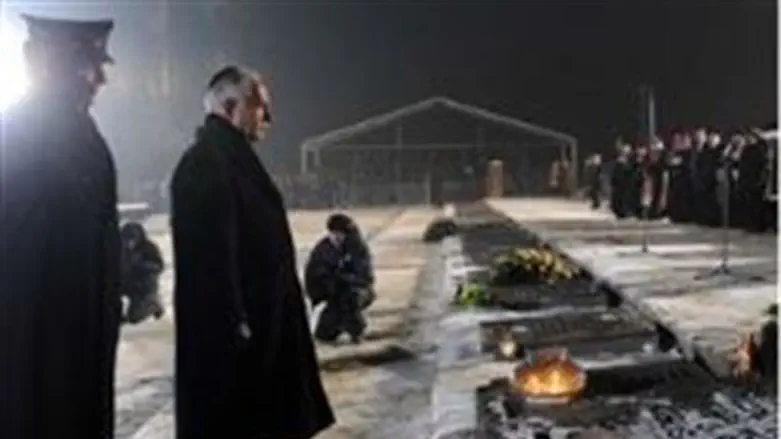
Noach Flug, Chairman of the Organization of Holocaust Survivors in Israel and President of the International Auschwitz Committee, has passed away at age 85. Flug, born in Poland in 1925, was forced with his family to move to the Lodz ghetto in 1939. In 1944 he was deported to Auschwitz, and was moved afterwards to three other camps as the Nazis retreated from eastern Europe. He was liberated in Ebense by American units on May 6, 1945. Flug immigrated to Israel in 1958 with his wife and two daughters, where he worked as an economist in the Finance Ministry.
Flug was a well-known activist on behalf of Holocaust survivors, leading efforts to increase stipends and ensure the rights of survivors. Flug was instrumental in achieving a deal in 2007 with the Treasury and then-Prime Minister Ehud Olmert to provide and additional NIS 1.5 billion for survivors, increasing their monthly National Insurance stipend by an average of over NIS 1,000.
In his last interview with Arutz Sheva, which took place about six months ago, Flug talked about an agreement he helped engineer between Bank Leumi and the Company for Location and Restitution of Holocaust Victims' Assets, whereby the bank would pay the company NIS 130 million in unclaimed funds that had been deposited by Holocaust victims. “There are today about 200,000 Holocaust survivors in Israel, and some of them are in very poor health. Many of those in poor health are refugees from Russia who were forced to flee Nazi persecution and ended up in eastern bloc countries.”
Flug expressed hope that survivors would eventually get all the assets that belonged to them, despite the fact that in several of the agreements he negotiated on their behalf critics said he could have achieved more. “This issue has been going on for years. Most of the survivors who are still living are elderly, and some of them are ill and require care and medicine. If we had continued fighting for their full rights in court, the cases would have continued for many more years, which they probably don't have. It was better to compromise,” he said.
Flug also said that he hoped that a deal for compensation could be made with European countries. “The Nazis murdered whole families who left many assets, such as land and bank accounts, behind. Unfortunately, not all European countries are cooperative. Some Western European countries, such as Holland, France, Belgium and Switzerland have transferred survivors' assets, and some, like Romania, have made partial compensation, but other countries, such as Poland and Lithuania, have not. We recently began a new organization to deal specifically with this issue, and we hope to resolve it,” he added.